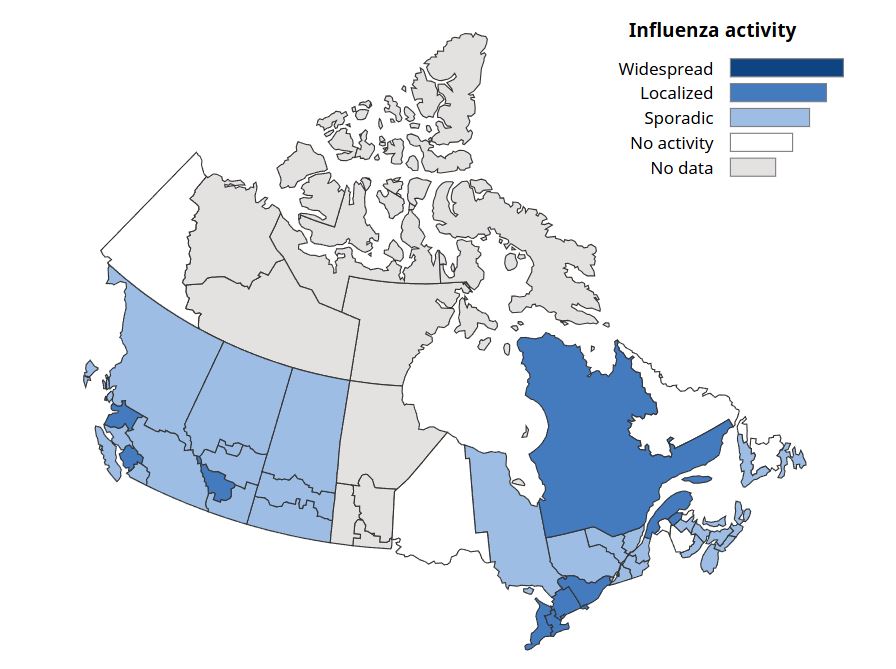Calgary and the surrounding area has become one of the hot spots for the flu in Canada, according to the latest Canadian respiratory virus surveillance report, published by Health Canada.

Calgary joins B.C.’s Lower Mainland, B.C. north coast, southern Ontario, northern Quebec, the Gaspe Peninsula and northern New Brunswick as the areas of the country where Health Canada is reporting localized influenza outbreaks.
 View image in full screen
According to the latest Canadian respiratory virus surveillance report, Calgary has become one of the hot spots for flu outbreaks in Canada.
Courtesy: Health Canada
View image in full screen
According to the latest Canadian respiratory virus surveillance report, Calgary has become one of the hot spots for flu outbreaks in Canada.
Courtesy: Health Canada
Mathieu Giroux, pharmacist at Calgary’s Cambrian Pharmacy in Northmount Village, told Global News the increase in the number of people getting the flu has also led to a recent jump in the number of people booking a flu shot.
Story continues below advertisement“We’ve been doing vaccines since mid-October and we’re going on week six or seven and it’s still pretty much fully booked every day. So there’s a lot of demand,” said Giroux.
 5:49
What you need to know this flu season
5:49
What you need to know this flu season
Despite the recent demand, there has been a big drop in the number of people getting vaccinated this year.

Get weekly health news
Receive the latest medical news and health information delivered to you every Sunday. Sign up for weekly health newsletter Sign Up By providing your email address, you have read and agree to Global News' Terms and Conditions and Privacy Policy.So far only about 712,000 have rolled up their sleeve, compared to over a million last year and over 1.6 million that got the shot five years ago.
“I get the flu shot every year,” said Calgarian Carolyn Levitz. “Since I started getting it about five years ago I just never get sick. I find it’s really, really effective.
Others seem less convinced.
“The kids go to daycare and stuff and as long as you eat healthy and everything should be good,” said Cal Aube.
According to the government of Alberta’s respiratory virus dashboard, there have been 251 hospitalized with the flu virus in Alberta so far this year, with 17 of them in intensive care and six deaths.
Story continues below advertisementBy comparison, there have been almost twice that number of Albertans hospitalized with COVID and 49 deaths.
While H1N1 was predicted to be the dominant strain of the flu this winter by makers of the flu vaccine, the H3N2 strain has become much more common in recent weeks, meaning the vaccine may not be as effective as originally hoped.
 View image in full screen
According to the government of Alberta’s respiratory virus dashboard, H3N2 has now become the dominant flu strain in most laboratory-confirmed cases in the province.
Courtesy: Government of Alberta
View image in full screen
According to the government of Alberta’s respiratory virus dashboard, H3N2 has now become the dominant flu strain in most laboratory-confirmed cases in the province.
Courtesy: Government of Alberta
“Flu vaccines are always a prediction, a calculation based on the southern hemisphere,” said Giroux.
“That being said, there’s always cross-reaction between those strains — you still get some immunity out of them because you don’t have a perfect fit for your antibodies, but immunity is much more complex than that so there’s layers of immunity so you still get like some coverage,” said Giroux.
Story continues below advertisement“The goal for any vaccine like COVID or flu is always to keep you out of the hospital — so you still get really good protection.”
Tweet This Click to share quote on Twitter: "The goal for any vaccine like COVID or flu is always to keep you out of the hospital — so you still get really good protection."
Judging by the trend over the past few years, Giroux predicts the flu outbreak is just “ramping up” and he expects it to hit its peak in late December or early January.
 4:04
Ask the Expert: Protecting yourself and your family against the flu
Related News
4:04
Ask the Expert: Protecting yourself and your family against the flu
Related News
- How does this year’s flu shot stack up to current strains? What we know
- 9 necessities for fighting the cold and flu
- Flu, COVID-19 vaccination numbers concerning, says epidemiologist
- British Columbians urged to get flu, COVID-19 shots amid vaccine ‘disinformation’




